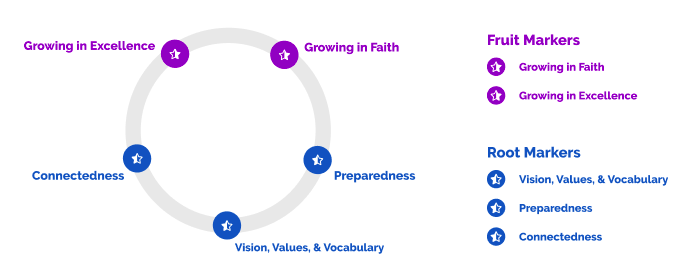Vision for Your Church Volunteer Ministry Team
Vision is the ability to think about or plan the future with imagination or wisdom.
Oxford Dictionary
Before we jump into the meat of this post, I want to explain why I’m talking about vision when it comes to volunteer teams.
Many leaders have never considered establishing a well-articulated vision for their church volunteer team. It’s not that they think it’s unnecessary, it’s that the busyness of working IN the ministry doesn’t make room for working ON the ministry. But to clearly articulate a vision for your volunteer team, you have to spend time working ON your ministry.
That’s really the whole idea behind the LeadUp Framework. It gives you a plan for working ON your ministry to:
- Shape your team’s culture
- Increase team member engagement
- Develop leaders within your ministry department
- Improve overall performance in a way that reaches your ministry goals
Read more about the LeadUp Framework:
- Introducing the LeadUp Framework and How Volunteer Culture Impacts Everything Else
- Thriving Volunteer Culture: The Five LeadUp Health Markers Explained
The 3-Vs: Vision, Values, and Vocabulary
There are five health markers in the LeadUp Framework.
- The 3-Vs
- Preparedness
- Connectedness
- Growing in Faith
- Growing in Excellence
The first marker in the LeadUp Framework is the 3-Vs. The 3-Vs are a succinct way of clarifying what matters to you and your team. They also form the foundation for culture-building on your team and shape how the rest of the framework functions.
- Vision is what you want your ministry to look like in the future.
- Values is what you care about most related to your ministry.
- Vocabulary is how your vision and values shape your team’s shared language.
The five health markers are divided between two types of markers: Root Markers and Fruit Markers. The Root Markers create greater opportunity for the Fruit Markers in your ministry to flourish.

The 3-Vs are considered one of the Root Markers because, once established and ingrained in your team, they contribute to the effectiveness of your efforts in Preparedness and Connectedness that leads to greater Faith and Excellence.
When it comes to the 3-Vs, vision is the “first among equals.” All three, vision/values/vocabulary, are vital, but without the vision clearly established, it will be very difficult to discover your team’s true values (what you care about most) and vocabulary (your team’s shared language).
Therefore, we will start the development of the LeadUp Framework by defining what vision is, why you need it, where it comes from, and how you find it.
What is a vision for a church volunteer team?
When it comes to vision, there are many questions to consider. First, of course, is “what is vision” as it pertains to volunteer teams in ministry?
Some call vision a “picture of a preferred future”. The Oxford Dictionary defines vision as “the ability to think about or plan the future with imagination or wisdom.”
I have a different definition of vision.
Vision is who you serve + what motivates you + a glimpse at how you’re going to do ministry.
For example, in the case of a children’s ministry, your vision might be something like this:
I serve the children of the families that attend our church. I’m motivated by the opportunity to share the gospel clearly in a way that children can understand. I’m going to create an environment where children can hear the gospel where they are safe and surrounded by people who love them.
Here’s another example for a student ministry:
I serve the next generation of adults. I’m motivated to see them grow in their faith in a way that prepares them for life. I’m going to build trusting relationships that help young people grow toward maturity in all things.
Here’s one more example, this time for a worship ministry:
I serve our church body. I’m motivated by the opportunity to help others experience authentic, Spirit-led worship that brings them into a closer relationship with God. I’m going to plan and lead worship experiences that let people connect to God exactly where they are.
This format is helpful because it gives you a structure for painting a picture of the future. Most vision framing is done in the context of a memorable phrase, which means most leaders spend their time “wordsmithing” the phrasing they use rather than first articulating exactly what matters most.
However, you can still take this vision structure and create a memorable vision statement that can be communicated in one breath.
Memorable vision statement for children’s ministry:
That our children would hear the gospel in a safe space and come to know Jesus
Memorable vision statement for youth ministry:
That the next generation would grow in maturity through relationships with trusted adults
Memorable vision for worship ministry:
That our church body would experience authentic, Spirit-led worship together
Should a ministry team have a separate vision from the rest of the church?
The short answer is, yes. However, a ministry team’s vision should never be opposed to or outside the bounds of the church’s broader vision. It should work within the scope of the vision of the church set by the pastor or executive leadership.
Your ministry team needs a uniquely articulated vision because your team does unique work from the rest of the church. You could say that your ministry’s vision is a focused, ministry-specific expression of your church’s overall vision. In other words, your vision is what the church’s vision looks like when applied specifically to your ministry area.
Aubrey Malpurs says that vision encourages unity, creates energy, provides purpose, fosters risk taking, enhances leadership, promotes excellence, and sustains ministry. These are all elements of culture-building. Your ministry team will have a unique culture and, therefore, it needs a unique vision.

7 Steps to Discover and Articulate a Vision for Your Volunteer Ministry Team
- Pray – Ask God to give you clarity and focus on what He wants for your ministry. Ask him to make clear what you care about most, what gives you a passion for your ministry area, and what energizes you personally about doing ministry week in, week out.
- Write down everything – As you pray over days and weeks about your ministry’s vision, write down in a journal or notebook what God is making clear to you. That clarity will likely not only come during your times of prayer, but also while you’re working IN and ON your ministry. Be attentive to the whisper of the Holy Spirit giving you direction at all times.
- Simplify your vision down to one breath – A vision is much more than a vision statement, but a single statement is incredible useful in communicating your vision. A full explanation of your vision may be three full sentences like the examples above, but your vision statement needs to be a single breath. That usually means 15 words or fewer.
- Avoid injecting strategy and tactics into your vision – Your vision should include some “how” language, but you must be cognizant that your ministry strategy will change with time. However, your vision should rarely change.
- Communicate your vision statement and supporting explanation in concentric circles – Communicate first with your pastor to get their buy-in. Then loop in your fellow staff leaders so they know what you’re working on. Then cast vision to your close team leaders and coaches in closed-group meetings. Finally, weave the language of your vision into every conversation and announcement with volunteers and other participants in your ministry.
- Get comfortable with redundancy – You’re going to need to communicate the vision with everyone, constantly, all the time. You will speak it and hear it spoken 10 times for every 1 time that someone else does. That means you have to love it enough to say it many times, daily even, for it to be driven home in the hearts of others.
- Start mining your vision-conversations for common language – The words you find yourself using over and over, the phrases that resonate and make people sit up in their seat, and the ideas that move people…these are the words that will become your volunteer vocabulary.
Train church volunteers and disciples online, easy.
Use our simple on-demand video training courses to equip volunteers, develop leaders, and teach disciples. Create your own training or use our video library. Our training automation platform makes it simple and fast to get your people ready for ministry.
Other Posts You May Like
All Growth Begins with Self-Awareness
My first year on the YouVersion Bible App team was exciting and challenging. I joined the team to help with partnerships and community-building. Like any new job, the first year came with a learning curve and the need to pick up new skills. I had never been part of a technology team before, so I…
Is Your Leadership Style Helping or Hurting You?
Your leadership style — how you make decisions, connect with and influence others, delegate, handle conflict, cast vision — is shaped by many factors. Your family history and work experience, along with your personality and internal wiring, impact how you think about and “do” leadership today. Leaders we have worked with, for better or worse,…
A Church Is Only As Healthy As Its Team
When you joined the team at your church, what kind of training did you get in the first weeks? Did you have an HR meeting to cover the health insurance and retirement accounts? Did you cover how to submit an expense report or reserve a room on the master calendar? How about how to handle…



